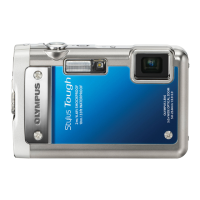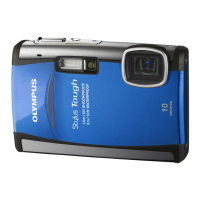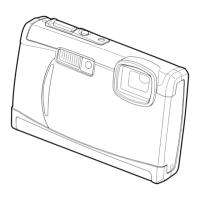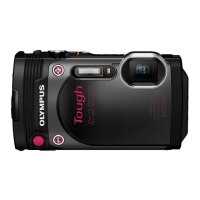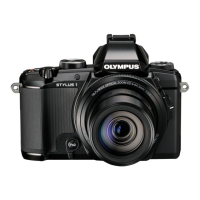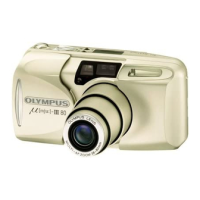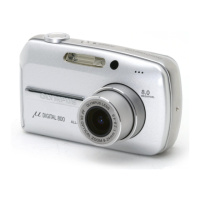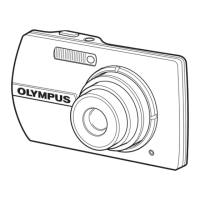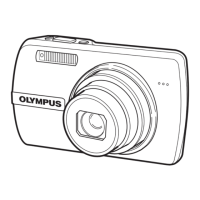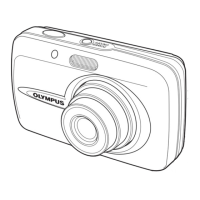Before
Use:
• Check the camera for foreign material
including dirt, dust or sand.
• Be sure to close the battery/card compartment
cover and connector cover firmly so that each
lock makes clicking sound.
• Do not open the battery/card compartment
cover and connector cover with wet hands
while under water, or
in
a damp or dusty ,
environment (e.g. beach).
After
Use:
• Be sure to wipe off any excess water or debris
after using the camera under water.
•
After
the
camera
is
used
under
seawater,
immerse
the
camera in a
bucket
containing
fresh
water
for
about
10
minutes
(with
the
battery/card
compartment
cover
and
connector
cover
firmly
closed).
After
that,
dry
the
camera
in
a
shade
with
good
ventilation.
• Water
drops
may be
observed
on
the
inner
surface
of
the
battery/card
compartment
cover
or
connector
cover
after
you
open
each cover.
If
any
water
drops
are
found,
be
sure
to
wipe
them
off
before
using
the
camera.
Notes
after
use
• Foreign materials may be attached to the
periphery
of
the lens cover from using the
camera
in
conditions with foreign materials
such as dirt, dust or sand, or when the lens
cover is not moving smoothly.
If
you continue
to use the camera
in
such conditions, the lens
could become damaged or the lens cover
could stick causing additional damage to the
camera.
To
avoid such damage, wash the
camera using the following method.
CD
Insert the battery and close the battery/
card compartment cover and connector
cover firmly so that each lock makes the
clicking sound.
/""
. .
'2)
Fill a bucket with fresh water, immerse
the camera
in
the bucket with the lens
surface downward and shake the camera
thoroughly.
(~)
Press the
ON/OFF
button several times
in
the water and close/open the lens cover
repeatedly.
(4
1
Furthermore, shake the camera further
with the cover opened.
Follow the Steps
CD
to
(4.\
then check if the
lens cover moves smoothly.
If the lens cover does not move smoothly,
rinse the lens face
by
placing it directly under
a strong stream of tap water and pressing the
ON/OFF
button repeatedly.
Storage
and
Maintenance
• Do not leave the camera
in
an
environment at
high temperature (40°C (104°F) or more) or at
low temperature (-10°C (14°F) or less). Failure
to do so may break down water resistance.
• Do not use chemicals for cleaning, rust
prevention, anti-fogging, repairing, etc. Failure
to do
so
may break down water resistance.
• Do
not
leave the camera in
water
for
a
long
time. Failure
to
do
so
will
cause
damage
to
the
camera's appearance
and/or
deteriorate
water
resistance.
• In
order
to
preserve
the
water
resistant
feature, as
with
any
underwater
housing,
it
is
recommended
that
the
waterproof
packing
(and seals) are replaced annually.
For
the
Olympus
distributors
or
service
stations
where
the
waterproof
packing
can
be replaced,
visit
Olympus
website
for
your
local
area.
EN
Before
Use:
• Check the camera for foreign material
including dirt, dust or sand.
• Be sure to close the battery/card compartment
cover and connector cover firmly so that each
lock makes clicking sound.
• Do not open the battery/card compartment
cover and connector cover with wet hands
while under water, or
in
a damp or dusty ,
environment (e.g. beach).
After
Use:
• Be sure to wipe off any excess water or debris
after using the camera under water.
•
After
the
camera
is
used
under
seawater,
immerse
the
camera in a
bucket
containing
fresh
water
for
about
10
minutes
(with
the
battery/card
compartment
cover
and
connector
cover
firmly
closed).
After
that,
dry
the
camera
in
a
shade
with
good
ventilation.
• Water
drops
may be
observed
on
the
inner
surface
of
the
battery/card
compartment
cover
or
connector
cover
after
you
open
each cover.
If
any
water
drops
are
found,
be
sure
to
wipe
them
off
before
using
the
camera.
Notes
after
use
• Foreign materials may be attached to the
periphery
of
the lens cover from using the
camera
in
conditions with foreign materials
such as dirt, dust or sand, or when the lens
cover is not moving smoothly.
If
you continue
to use the camera
in
such conditions, the lens
could become damaged or the lens cover
could stick causing additional damage to the
camera.
To
avoid such damage, wash the
camera using the following method.
CD
Insert the battery and close the battery/
card compartment cover and connector
cover firmly so that each lock makes the
clicking sound.
/""
. .
'2)
Fill a bucket with fresh water, immerse
the camera
in
the bucket with the lens
surface downward and shake the camera
thoroughly.
(~)
Press the
ON/OFF
button several times
in
the water and close/open the lens cover
repeatedly.
(4
1
Furthermore, shake the camera further
with the cover opened.
Follow the Steps
CD
to
(4.\
then check if the
lens cover moves smoothly.
If the lens cover does not move smoothly,
rinse the lens face
by
placing it directly under
a strong stream of tap water and pressing the
ON/OFF
button repeatedly.
Storage
and
Maintenance
• Do not leave the camera
in
an
environment at
high temperature (40°C (104°F) or more) or at
low temperature (-10°C (14°F) or less). Failure
to do so may break down water resistance.
• Do not use chemicals for cleaning, rust
prevention, anti-fogging, repairing, etc. Failure
to do
so
may break down water resistance.
• Do
not
leave the camera in
water
for
a
long
time. Failure
to
do
so
will
cause
damage
to
the
camera's appearance
and/or
deteriorate
water
resistance.
• In
order
to
preserve
the
water
resistant
feature, as
with
any
underwater
housing,
it
is
recommended
that
the
waterproof
packing
(and seals) are replaced annually.
For
the
Olympus
distributors
or
service
stations
where
the
waterproof
packing
can
be replaced,
visit
Olympus
website
for
your
local
area.
EN
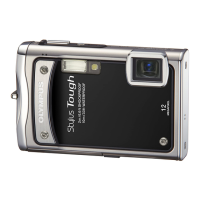
